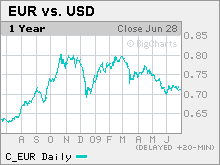Dollar rises on lower consumer confidence
Investors seek safe haven U.S. currency as hopes for economic recovery lessen.
NEW YORK (Reuters) -- The dollar gained against a basket of currencies Tuesday after a report showing an unexpected drop in U.S. consumer confidence for June, prompting investors to seek shelter in the greenback.
The weak consumer confidence report drove U.S. stocks lower, put a halt to an early sell-off in the dollar, and dampened hopes for an early recovery around the world.
"The market is getting comfortable with the 'green shoots' theory so investors need a high hurdle for them to buy currencies other than the dollar," said David Watt, senior currency strategist at RBC Capital Markets in Toronto.
"We're still seeing stress and strains in the market. We're going into the earnings season now that the second quarter has ended and people are cautious."
Analysts also said the simultaneous end to the month, quarter and half year led to increased volatility in foreign exchange trading, exacerbating intraday moves in currencies. These month-end and quarter-end flows have supported the dollar, though, analysts said, as investors sought to rebalance their portfolios.
In early afternoon trading in New York, the euro was last down 0.4% at $1.4022 after trading as high as $1.4152 earlier, according to Reuters data.
Despite Tuesday's gains versus the euro, the dollar was still on track for its first quarterly drop against the single currency since the first quarter of 2008.
At the same time, an index measuring the value of the greenback against a basket of major currencies declined more than 6% for the quarter, its first quarterly decline since the first three months of 2008. The index was up 0.4% at 80.166.
The dollar also rose against the yen to 96.35.
Dollar buying ensued after a report showed the Conference Board's U.S. consumer confidence index fell in June to 49.3 from a downwardly revised 54.8 in May. Economists polled by Reuters had forecast a reading of 55.0.
The decline in consumer confidence "was a big shocker," said Kathy Lien, a director for currency research at GFT Forex in New York. "The weaker confidence number should help the dollar recovery for the rest of the day."
The confidence index followed a report showing a smaller-than-expected slip in U.S. home prices in April and a Chicago purchasing managers' report on business activity in the U.S. Midwest.
Investors have sold U.S. dollars recently as stock markets andoil prices rose on an upbeat view for prospects of a global economic recovery, hurting demand for the greenback as a safe haven.
The MSCI global stocks index was on course for its best quarter since its launch in 1988, up 20.9% at current prices, while oil earlier hit an eight-month high of $73.38 a barrel.
The expectation of global economic improvement gained support from the CBOE Volatility Index, Wall Street's fear gauge, which is at its lowest level since just before Lehman Brothers collapsed last September.
That pushed currency vols lower, too, with the one-month implied vols in euro/dollar falling to 12.6 from about 23.2 at the start of the year. Some analysts say the drop in currency volatility could trigger a downturn in the dollar. ![]()


